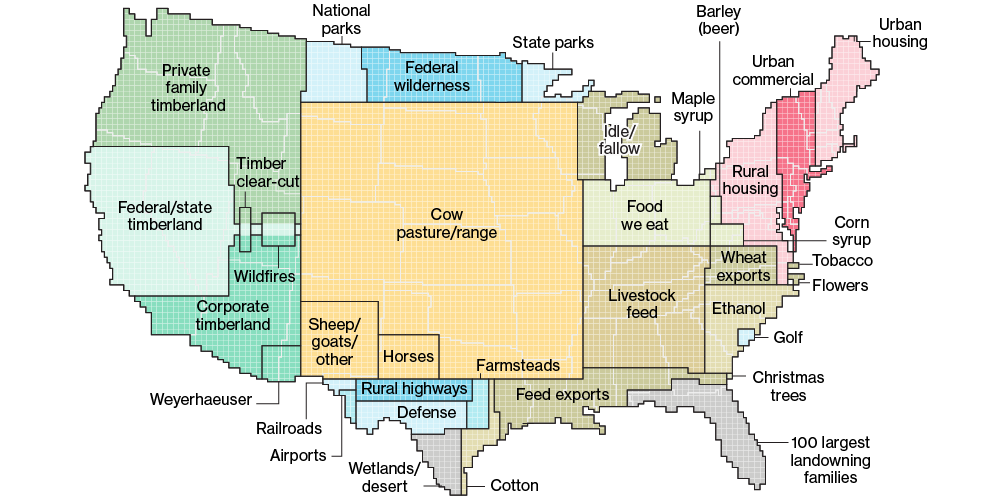- Show

Hear ye hear ye. This is the actual visualization
Source:
https://www.bloomberg.com/graphics/2018-us-land-use/
seeing this all at once. its a lot. There is so much you can learn about the US just by looking at this. I hate it.
Not a single one of these sections is the correct size. Except maybe the maple syrup and the beer.
Replacing half of the cow pasture with (properly managed) timber would solve the worlds lumber shortage. I'd like to see more bamboo being grown. Its great for any buildings that are 4 stories or less. Or is it 3?
LOOK AT RURAL HIGHWAYS VERSUS TRAINS. FOR FUCKS SAKE.

tbf, a railroad is much more land efficient then highways so I'd expect that number to be pretty small no matter what. Though I suppose you could make the argument that the rural highways number should be zero, which is valid too.
I'm pretty annoyed they don't have parking lots or suburbs in there. Why are "rural highways" called out, but not the millions of miles of sprawling suburban roads?
Actually I think rural highways are fine. In my ideal world every city and town is connected by two lane each way highways. The highways would be along side freight and passenger rail lines.
The problem, imo, is with all the 4 lane each way highways. Making all the highways 2 lane each way would probably reduce total land use by a lot. But I could be misinterpreting the map. Its not clear what "rural" highway means. It also doesn't show total road usage. Extra road from sprawl is way worse than from rural highways. Poor town planning in the country also contributes. We should have villages instead of the weird clusterfuck of separated houses that are 2 hours by car from a hospital and 30 minutes from a grocery store.
Regardless it should be trains instead of trucks moving freight. In such a world I would imagine the train land usage would be around 1/3 of rural highways. In that map its about 1/9. Its less about the size of the rural highways and more about the size of the railways. If the USA didn't tear up all their rail infrastructure in the early 1900s it'd probably be like that today.
I think personal cars will always be a part of country life. And thats ok. But they should have an accessible train for long distances. Between ambulances, firetrucks, disability transportation, various work vehicals, and isolated people, cars have important uses. And they need roads.
Literally the problem is just suburbia. 15 minute cities, 5 minute neighborhoods.
Have fun trying to stop climate change without reducing meat consumption, not to mention other problems like desertification and soil degradation.
The earth is an ecosystem with a metabolism, and humans take out of it way more than return, and with capitalism that isn't going to change anytime soon.
You can go "sweetie, but meat tastes good!" all you want, not to mention your bizzarre comment on optimizing land usage for population growth. It's not a question of morality - it's a question of not being a fool.
Not only that, but we're talking about a country with some of the highest per-capita beef consumption in the world. Beef has an order of magnitude higher impact on emissions as other meats. It's so fucking inefficient it's insane.
I think it's much easier to shift people to more efficient meats than it is to cut meat out entirely.
Easier yes, I suppose.
It's still a half measure that will at best delay the worst effects of climate change (such as many other mainstream proposals to combat it) and there's a difference between how radical the changes to society will be and whether climate change will be bad, very bad, very very bad or lead to Medieval death rates
Actually, that did happen while I lived with my immediate biological family in my formative years.
To say nothing of the fact that we're forced to fund the torture and killing of animals in the form of federal beef subsidies. Or that in some cases institutionalized people (in prisons, asylums, etc.) are, in fact, made to eat meat and may very well be force-fed if they refuse to.
And carnists still have the nerve to act like they're the aggrieved party every time they're forced to remember we exist, lol. I can only imagine how they'd act if the positions were reversed and we were winning as hard as they are.
These "treats" you keep bringing up, most people call food. If you are against humans eating food, then this is the org for you. https://www.vhemt.org/
Now let's get to the meat of the issue. ALL human food production causes non-zero emissions, yes even the food you eat. Yes even if you grow it yourself. According to the link you provided "meat accounts for ~60% of green house gas emissions from food production." I would say, so what? Humans need to eat food and some food production is going to emit more green house gases then other food. Trying to optimize our diets to reduce our impact on the world at the expense of enjoying that world is something no one actually wants, including you. At the end of the day everyone has to eat food. So you say "But if we just cut meat production, we would reduce the green house gases of food production by 60%!" Well in less then 80years, the population of the earth is projected to be ~11billion. That is ~50% more people and thus 50% more greenhouse gases emitted from food. So now what do you now?
It's 2100ad, and we got rid of meat 80years ago, along with 10,000 years of human culinary culture and animal husbandry, and now we are right back where we started as far as green house gases (though probably worse because fossil fuels are still around). So what have you solved? What did destroying a huge part of the essence of human society accomplish? Hundreds and thousands of cultures were told that because burning coal and natural gas is cheaper and certian people will get rich from continuing to do that, those billions of people can't have certain kinds of food anymore. That's not a deal anyone will take, nor should they.
That's mainly because you can raise livestock/ruminants on non arable land. But the idea that ranchers should be able to just use any land without proper consideration for the environment is crazy.
My responses to that are:
-
What counts as arable? Can you grow literally nothing on it, or is it just unusable for mass industrial mono-cropping at a scale that competes?
-
IIRC even if ruminant grazing is the most efficient way to produce food on this land, it's still be a severe environmental net negative as opposed to other non-food uses, namely rewilding. Of course this is true for cash crops as well, and I don't know how the payoff compares, but a lot of animal agriculture defenders like to use this argument to imply that grazers can just be slotted in on the margins with no downside.
-
Based on the map in the article, a substantial portion of land still goes to farmed livestock feed. Eliminate all of that first and then we can actually see how much of this beef is purely ranched.
Meat eaters do love to champion the most ethical and environmental corners of their supply chain, and I appreciate that, but everyone I know that buys a half cow for their deep freezer from a sustainable local farmer refuses to draw the hard line in the fast food drive-thru. "Conscious" meat exists to justify all meat consumption rather than replace it in the supply chain, from my experience growing up on a small hobby farm trying to produce it.
What you're describing in your last paragraph is virtue signaling, e.g publicly expressing some moral position to gain approval without actually following through on that moral position. That's not something to appreciate.
It is extremely commonplace in meat eater circles to virtue signal about ethical meat and then completely ignore that for the vast majority of consumption. This is a huge difference between vegans and meat eaters.
Vegans aren't virtue signaling, we actually have an understanding of what we believe to be a moral truth; it's wrong to kill and harm things for your own pleasure, whether that be taste pleasure, sexual pleasure, whatever, and we extend that as far as we're able to. We actively avoid food that purposefully necessitates killing and suffering.
Meat eaters advocate for some local maximum, like "I can't give up meat because it's too tasty, but I can at least avoid factory farming", and then they'll go to McDonalds 3 times a week once they're outside of a discussion with a vegan.
I'm much less frustrated with people who both advocate for and commit to some moral position. If someone abstains from all sources of fast food and factory farming meat and only goes out and handpicks cows to slaughter that they've known from birth, that's better. It's still wrong to kill something without it's consent, but at the very least if they're not virtue signaling they're at least not trying to deceive others.
If someone abstains from all sources of fast food and factory farming meat and only goes out and handpicks cows to slaughter that they've known from birth, that's better.
There's zero chance there's a measurable amount of carnists who actually commit to that. There's also no way you could produce the amount of meat carnists want to eat without factory farming.
Eventually I think lab meat will be cheaper than factory meat. When that happens there will be. Until then fast food will always be made with the cheapest ingredients possible. Until then I'll be vegan.
-
A 2020 study published in the journal Nature Sustainability highlights the immense environmental potential of changing how we farm and eat. Researchers found that if all high-income countries shifted to a plant-based diet from 2015 to 2050, they’d free up enough land to sequester 32 gigatons of carbon dioxide — the equivalent of removing nine years of all those countries’ fossil fuel emissions from the atmosphere. Globally, if we shifted to plant-based diets over that same time period, the land saved could sequester the equivalent of 16 years of global fossil fuel emissions.
I agree, the meat industry should be nationalized along with agriculture and the energy sector.
Unlike agriculture and the energy sector, the meat industry isn't needed for anything. It should be ended.
Idk man, have you ever seen how poorly run government businesses like the DMV are?
DAE DMV?
Every time I hear someone complain about the DMV, USPS, etc, I assume they're being difficult to the workers. Every experience I've had with these kind of government services, I read up ahead on what I need, organize my shit, and show up prepared with a smile.
When I do that you see a wave of relief over the worker and they return the smile and respect. You can basically extrapolate the verbal abuse they deal with all day long.
With my secret method(being nice and respectful), every USPS worker I've interacted with has either been very friendly, or neutral but relieved.
Leave our brave troops alone goddamnit, be nice to them.
You're probably in an area with a functional DMV. I concede that some states run their DMV pretty well, but California certainly isn't one of them.
No, probably not. But the point remains that the government can be very disorganized, underfunded, and just generally bad at running facilities. If we hand out food production off to the government then we need to take extreme measures to ensure they have adequate funding, competent leadership, and are well insulated from corruption.
I'm not proposing anything. I literally said "idk man". I'm just pointing out that "give it to the government" isn't a one and done solution.
You missed the message for the word. Call it whatever you need to, facility or what not. The point is that it's awful in places like California.
in places like California
so a government can run a DMV well? if such a thing is specific to some places and not others, you cannot make it a general rule, can you?
I'm certainly not a MAGA proponent. I didn't say I wanted it privatized. It was meant to be an example of the disaster that governments can make of something relatively simple. We can't afford that with our primary food supply. So if it was handed off to the government, extreme measures would need to be taken to ensure it's properly funded, managed by competent and qualified people, and well insulated from corruption. It's not as simple as "just let the government do it".
Yes, actually. The DMV in Washington is surprisingly well run. But the California DMV is a nightmare that we cannot allow to happen with our food supply. Ultimately it's not a simple handover and there would need to be abundant safeguards in place to ensure our food supply is managed competently and insulated from corruption.
Well when you try to run a service that is by definition unprofitable, "like a business," the only way to hit the financial metrics is to cut salary and headcount. This obviously leads to shitty service. That said in states like New York and Illinois the DMV is actually pretty well run, though the number of locations and hours of operation leaves something to be desired.
It’s just a question of resources. Typical neoliberal strategy, strip budgets down to the bone, take out half the marrow, when the whole thing crumbles point at it and say “look how shitty this is, we need to privatize it!”
Austerity is theft
I think we're factoring in a change of US government. The Problem with the US is that nationalization usually means controlling it in order to privatize its core functions.
lets be real the US wouldn't deign to commit the sin of nationalization even if they were to sell it off later
i mean they didn't even let Truman, who was keeping the ww2 arms industry half-alive with Korea nationalize steel. and that was before we had neoliberalism

How do you know someone's a carnist? Don't worry, they'll tell you.
High land use harm native species and has great environmental consequences as described in the article
There's more to consider than just how much land is available to humans












